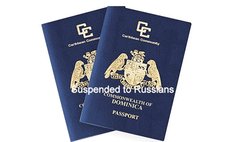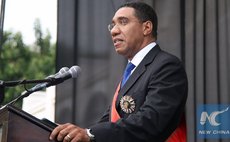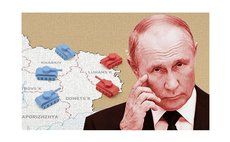The Panama connection
A few days ago the leader of the British Labour Party, Jeremy Corbyn, called on the British Prime Minister to consider taking direct control of Britain's Caribbean overseas territories. His remarks - not without irony, as of all of the members of the British Parliament, he is among those with the strongest track record as an anti-imperialist – respond to the the global furor over the so called Panama Papers.
These are the 11.5m files taken from the database of the Panama based offshore law firm, Mossack Fonseca & Co, which were sent in 2014 in digitized form on an unsolicited basis from an anonymous source to the German newspaper, the Süddeutsche Zeitung. They were subsequently shared with the International Consortium of Investigative Journalists (ICIJ) in Washington and then researched by about 100 newspapers and broadcasters worldwide.
The documents' contents link national leaders, politicians, their families, close associates, leading business people, individuals subject to UN sanctions, global figures in sports and entertainment, and narcotics-traffickers and other criminals, to companies and legal vehicles registered in or operated through low or no tax offshore financial centers such as the BVI or Bermuda.
In part they indicate how the global elite and the world's wealthy use these and other jurisdictions to reduce or obviate their tax liability, hide or launder money, or to obscure the origin or ownership of their assets.
Beyond the facts, however, the leaked documents raise broader questions. They shine a light on growing wealth inequality, the role of an ever growing army of intermediaries such as Mossack Fonseca dedicated to helping the very wealthy, and the questionable morality of the individuals and companies that seek to avoid the scrutiny of the societies in which they reside or operate.
That said, while the offshoring of wealth and assets may be morally dubious, hypocritical, and sometimes criminal, it is for the most part legal.
As such it is a reflection of just one of many contradictions between every government's interest in encouraging domestic growth and employment by ensuring that investment, money and assets are able to flow freely, and the need for sovereign states and political systems to respond to electorates that want them to exert greater control over those who do not contribute appropriate levels of tax in the countries in which they operate.
Unfortunately, when it comes to the Panamanian connection with the Caribbean, what seems to be lost in relation to the sometimes extraordinary revelations, is that the Caribbean offshore financial services being made use of, are legal, have mostly been developed with the active encouragement of successive British governments to facilitate the global role of the City of London, and underpin the economic stability of many small Caribbean nations.
That aside, the Panama papers raise many longer term issues that are more significant than the naming and shaming of individuals.
The first is that much of what is happening globally is being driven by an army of wealth management intermediaries - the lawyers, bankers, tax accountants, and other assorted advisers - who see huge business opportunity in advising the super-rich on ways that enable them to avoid taxes, debts, legal judgments, and other obligations that ordinary citizens, including the moderately wealthy cannot avoid. As with the counter-narcotics industry, the arms trade, NGOs and many other industries, once institutionalised such service roles become self-perpetuating, skewed and expanded in their purpose, and need to be better regulated and policed on an international basis.
A second emerging issue, despite the willingness of the Caribbean Overseas Territories to find ways to accommodate international requirements on information exchange and beneficial ownership, is that their role is being eclipsed by more opaque locations like Wyoming and Delaware in the US, Luxembourg in Europe, and Singapore, to say nothing of the rarely spoken about small nations like the Maldives or the Marshall Islands. The reality is that without all countries, dependent and independent, agreeing multilaterally to cease to offer offshore financial services, the desire of the powerful, wealthy and the criminal to hide their monetary affairs offshore will always be facilitated by one or another country.
A third is that the Panama Papers raise serious questions about regional cyber security. Mossack Fonseca have said that the leaked material became public because its site was hacked by someone in Europe. If this proves to be the case, it raises all sorts of new issues about the security of offshore financial centres and the ability of governments, lawyers, banks and other intermediaries to protect all of their client's secrets.
The fourth is the inability of Mr Corbyn and other politicians to understand the consequences of the nuclear option of imposing direct rule on nations like the BVI and Bermuda. They fail to think through the long term consequences at an international and regional level of such a response, or the probability that such actions would lead the overseas territories to accelerate their desire for independence; an outcome that could diminish present levels of co-operation with the UK and others.
And finally, while much of what has been made public may be distasteful, immoral and damaging, the impact is only likely to be felt in the most democratic of societies. It is no surprise that in Iceland the revelations have resulted in the resignation of the Prime Minister, but elsewhere the issue is likely to serve only to maintain the influence and power of those allegedly involved or who they protect, in the certain knowledge that if they were ever to lose office, the information would be used against them.
It is also worth observing that at the other end of the spectrum, it is likely that many of so far unnamed companies and individuals, who are of no interest to the international media, were using the services of Mossack Fonseca for perfectly legitimate reasons to structure international deals, establish family trusts, to create cross border joint ventures, and for other activities that are perfectly normal, unless they involve the use of criminal proceeds, tax evasion or fraud.
Despite this, the angry response to the emergence of a new wealthy elite, paying little tax will not go away, especially so in austerity hit developed nations that have sought to increase their revenue from their middle classes in order to deliver social services for all.
This is not to argue that what has been happening is correct let alone just, but to suggest that if governments like the UK, US and others willingly establish such facilities in order to gain economic advantage for their enterprises and financial centres, it is hardly surprising that aggressive tax advisers, political autocrats and the super-rich, will seize the opportunity to use such offshore anonymity to increase their wealth and power.
David Jessop is a consultant to the Caribbean Council and can be contacted at david.jessop@caribbean-council.org
Previous columns can be found at www.caribbean-council.org



